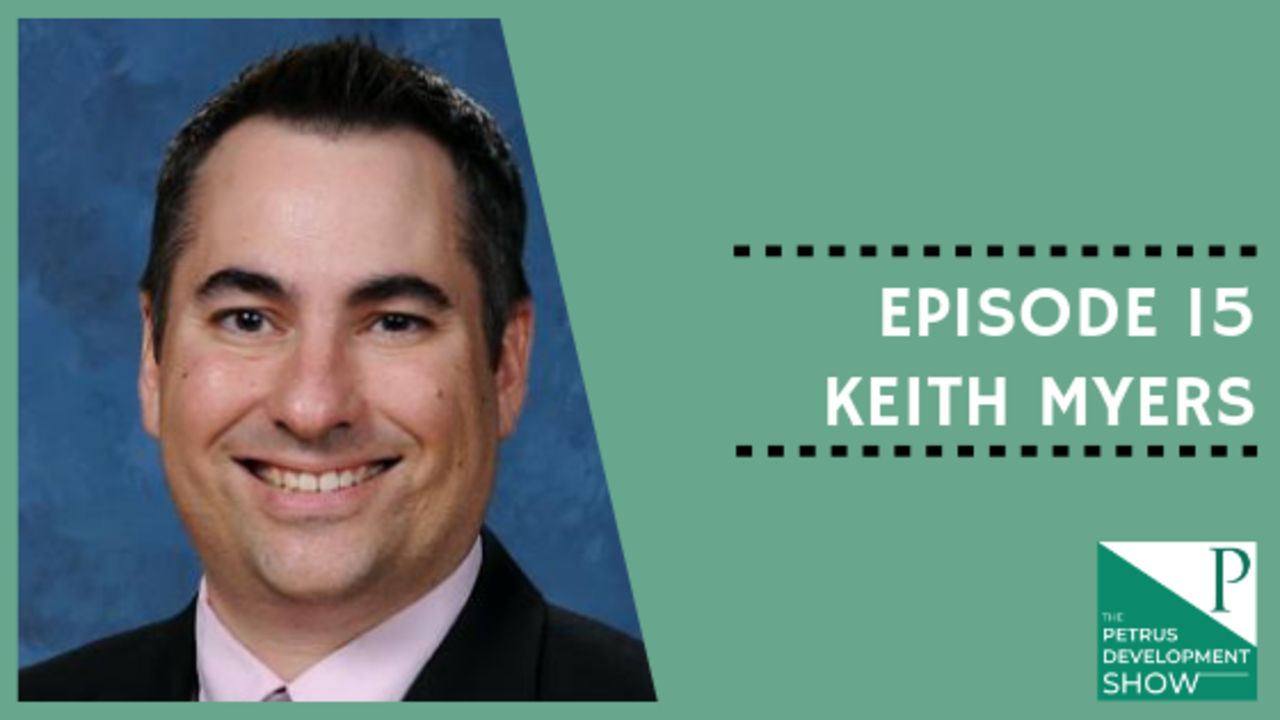Philanthropy, Purpose, and Presence: Interview with Keith Myers

Keith Myers, Director of Advancement, St. John XXIII College Preparatory
In this episode, Andrew visits with Keith Myers, the Director of Advancement for St. John XXIII College Preparatory in Houston, Texas. Keith and Andrew discuss the importance of tying the ministry of development into forming stewards with intentionality of purpose. They highlight the importance of Christ at the center of that intention. Keith learned valuable strategies for success in development though his career, which included work in campus ministry, secondary education, higher ed and even IT supercomputer sales. These strategies include setting clear goals and tracking your data. Ultimately, being truly present to another person is of utmost importance.
Show Notes:
- Andrew first worked with Keith in 2005 at St Mary’s Catholic Student Center in College Station when Keith trained Andrew as his replacement at St. Mary’s.
- Making friends with others in development is helpful so you have people to bounce ideas off of. The relationships you form with other officers in the field is one of the great things about the field. Forming that network is crucial for your long term success.
- 2001 Keith graduated with a degree in History from Texas A&M. Bishop Mike Sis (Pastor at St. Mary’s at the time) and Greg Gorman (Director of Development) needed someone to run a raffle and asked Keith to help out…After graduation asked to work full time.
- Keith attended CCMA conferences and learned development from other development professionals around the country.
- Had just begun the monthly giving program around his graduation. Electronic giving was still very new to most people and it was tough to get people involved.
- Class of 2005 was the first 100 students to sign up for the Senior Class Gift at St. Mary’s – Paves the way for young people to become philanthropically minded. Bears fruit in the future and people feel compelled to start giving more to great organizations.
- When development officers make an ask, it might be the first time someone has considered giving at a high level. But Andrew isn’t sure if people can naturally come to the realization that they can give at a high level and make an impact unless the invitation has been extended.
- Like sowing seed – the development officers working on annual fund, new gift, or first gift are tilling the soil. If the soil isn’t tilled by the things that get people involved then when you plant the seed by making the ask, the seed won’t grow.
- Catholic Development Officers have just as much of a teaching mission as a finance mission.
- Stewardship is part of our response to God’s call to discipleship in our life.
- The new evangelization is tied to stewardship and development. The development officer has to give up control of how the invitee will respond. The steward has to give up control of their money and give it back to God.
- Working to raise money for law students, Keith was able to align himself with the mission and see that it’s important that we have good lawyers and that this is good for our society, so he was able to take that into discussions with potential donors.
- Why do some development officers succeed and some fail? You have to set expectations with your bosses and everyone on your team needs clear goals. What does success look like? You will fail if you don’t have clear goals. Very common with start ups. And a lot of campus ministries are start ups. Cannot ignore the money. But have to be very clear on what success is in a dollar amount.
- Keith’s experience in sales and how he’s applied the lessons from sales to his development work. Lot’s of tracking of calls. Could see that if you didn’t get a certain number of calls in a week, you won’t get the meetings you need to keep going. We want the Church to stand the test of time, so Keith became very data driven.
- He saw that it was important to have telephone and skype meetings, to have agenda-driven meetings despite not being face to face. There’s lots of work to be done through these avenues, so that you can make your eventual face to face meeting very fruitful. Keith mentions that he doesn’t know if it’s “radical” for the development world, but in the business world, skype/telephone meetings certainly count as meetings. There is value in these meetings and it’s important to track and calculate them.
- You can’t always just do what you’re comfortable with; have to do what is best for the organization.
- Currently trying to build a culture of philanthropy at St. John’s. They know they will need large changes in the future; bigger buildings, etc. If they build this culture they will identify the people that will give them the transformative gift they need to expand as they need to. They want their young alumnis to get into the habit of giving. Fifty years out, they will need diversity of givers, so the work needs to be done now to get the younger alumni on board now.
- The relationships staff members have with donors, those relationships are bigger than the people – they are organizational. They want to leave those relationships better than they found them.
- Key strategies for development at St. John’s: They utilize online giving: giving days during National Catholic Schools Week. They are trying not to get bogged down in events. Want their events to lead people to a deeper relationship with the organization. Set goals!
- St. John’s was begun by a group of laymen, so there’s not a fraternal order associated with their school. So they have a board of governance.
- What is he doing now that he wasn’t doing early in his career: Spending more heavy time on the phone. Not just trying to get an appointment set up. Being truly present to the other person is important. He believes that looking at someone as a soul is just lost these days. Relationship has been eroded. Ministry of presence is so valuable.
Lightning Round:
- If you could fundraise for any organization or cause at any time in history, what would it be?
- I'd fundraise where I'm at, St. John XXIII.
- If you could get a donor meeting with anyone living or dead, who would it be?
- Monsignor Joe Crosswate. Their student center is named after him. He would like to know if the school is upholding his legacy in a way he would be proud.
- Is there enough money out there for every organization that's doing good work?
- Conditionally, yes. If we do our jobs well and teach people about why philanthropy is important, there will be money to go around. But, if we don’t do a good job we run the risk of having generations of people who don’t see this as a good.
- What is one piece of advice that you would give your past self?
- I wouldn’t have minded inventing the iPhone. I love technology.
- Who are 3 people who have most influenced you professionally?
- His wife Amy (one of his first donors)
- Bishop Sis (Presence ministry and the value of writing)
- CEO of XISS (created an organization and provided great leadership)
For more information about St. John XXIII College Prepartory or to connect with Keith, visit www.sj23lions.org or email him at [email protected].
Giving to religious causes vastly exceeds any other category in the nonprofit sector, but faith-based organizations often struggle the most with fundraising effectively. Join Andrew Robison, President of Petrus Development, as he explores this topic through honest and revealing conversations with church leaders, executive directors and development professionals from the nonprofit community.
READY TO BECOME A BETTER FUNDRAISER?
Sign up below to receive tools, ideas, and inspiration to take your development efforts to the next level.
We hate SPAM. We will never sell your information, for any reason.


